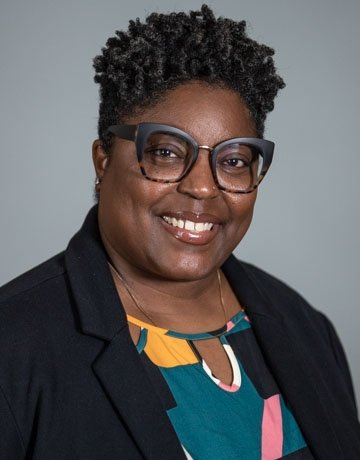The series opens with the documentary “Stamped from the Beginning,” on Thursday, Feb. 15, at 6 p.m. in Gaige 100.

- Department, Office, or School
- Department of History
- Africana Studies Program
- Assistant Professor
- emailscummings@ric.edu
- location_onCraig-Lee-B, 458
- arrow_circle_downDownload CV
Personal Information: Dr. Cummings is jointly appointed in History and Africana Studies and serves as the Historian and Director of Community Outreach for the Rhode Island Black Heritage Society. Her research interests include Africa and the Black Atlantic, Early African American History and Africana Intellectual History.
A native of New York City, Dr. Cummings earned her Ph.D. from Brown University where her research focused on the enslavement of African girls in the British Atlantic during from the sixteenth to eighteenth centuries.
Education
2022: Ph.D. Brown University
2018: Graduate Certificate in Africana Studies
2016: M.A. History - Brown University
2015: B.A., Africana Studies, Brooklyn College, Minors: History and English
Selected Publications
Article: “They are Delighted to Dance for Themselves”: Deconstructing Intimacies – Moreau de Saint- Méry’s “Danse” and the Spectre of Black Female Sexuality in Colonial Saint Domingue,” Journal of Caribbean History, Vol. 51, No. 2, December 2017, 143-170
Article: “Indian, Mixed, or African: The Metamorphosis of Tituba: Woman, Slave and Witch of Salem, A Historiographical Examination” Mellon Mays Undergraduate Fellowship Journal Fall / Winter 2014, pp. 31-36
Book Review: Emily Sahakian. Staging Creolization: Women’s Theater and Performance from the French Caribbean.” Charlottesville: University of Virginia Press, 2017. Journal of Caribbean History, Vol. 52, No. 2, 2018. 224
Book Review: Michael J. Gall and Richard F. Veit. Archaeologies of African American Life in the Upper Mid-Atlantic, Tuscaloosa: University of Alabama Press, 2017. Pennsylvania Historical Society, Vol. 143, No. 2, April 2019. 224-25
Courses
AFRI 200 - Introduction to Africana Studies
AFRI 350 – The Black Experience in Rhode Island
HIST101 – Multiple Voices in the World / Africana Intellectual History
Research
Spring 2023: Rhode Island Black Heritage Society: Historian and Curator for the Black History Month pop up exhibit “Before Martin and Malcolm, the Civil Rights Movement in Rhode Island.”
Fall 2022: Rhode island Black Heritage Society: Curator, Workshop Coordinator and Instructor for the Exhibit, Frank Jackson, Light and Shadow @see level.
Spring 2021: Researcher / Content Reviewer for The Erfenis / Legacies of Colonialism exhibit that is set to open in 2022 at the Research Center for Material Culture in the Netherlands. The project entails reviewing and presenting a critical analysis of scholarly works pertaining to the Dutch and their engagement in the Atlantic world, juxtaposed against themes of sovereignty, colonialism, slavery, abolition, and emancipation, and the afterlives of such themes on the descendants of Africans in the Dutch Atlantic as well as institutions (museums) that continue to benefit from the legacies of slavery and colonialism.
Summer 2020 Proctorship with the Center for the Study of Slavery and Justice (CSSJ) at Brown – Fall 2021: In partnership with the Smithsonian National Museum of African American History and Culture. Part of the research team working on the Global Curatorial Project creating new knowledge and innovative forms of public history about the historical experiences and the contemporary legacies of racial slavery and colonialism. Specifically, my research on Palmares in Brazil and the Haitian Revolution is centered on the exhibit, In Slavery’s Wake, which re-frames the history and legacies of slavery and colonialism as both a colonial and globally central narrative with deep relevance to the present, throughout the Atlantic world, Europe and Africa. Another research project that I have worked on examines the role of African women throughout the Diaspora and their participation in the medical and healing arts, with an emphasis on African knowledges and the adaptation of these knowledges to new world environments. Special attention is given to the practice of inoculation – from the Arab world, into West Africa and the Americas, the subversion of Black women’s herbal and medicinal practices and emphasis on African knowledges and the adaptation of these knowledges to new world environments. Special attention is given to the practice of inoculation – from the Arab world, into West Africa and the Americas, the subversion of Black women’s herbal and medicinal practices and the contextualization of the racist colonial mentality of experimentation on Africans and their descendants as scientists and financiers suggest the Covid-19 vaccine should be tested on Black and Brown bodies.
Fall 2017: John Carter Brown Library, “Global Americana” Exhibition. Contribution – “A Letter to Philo Africanus, upon slavery. London: 1786”
